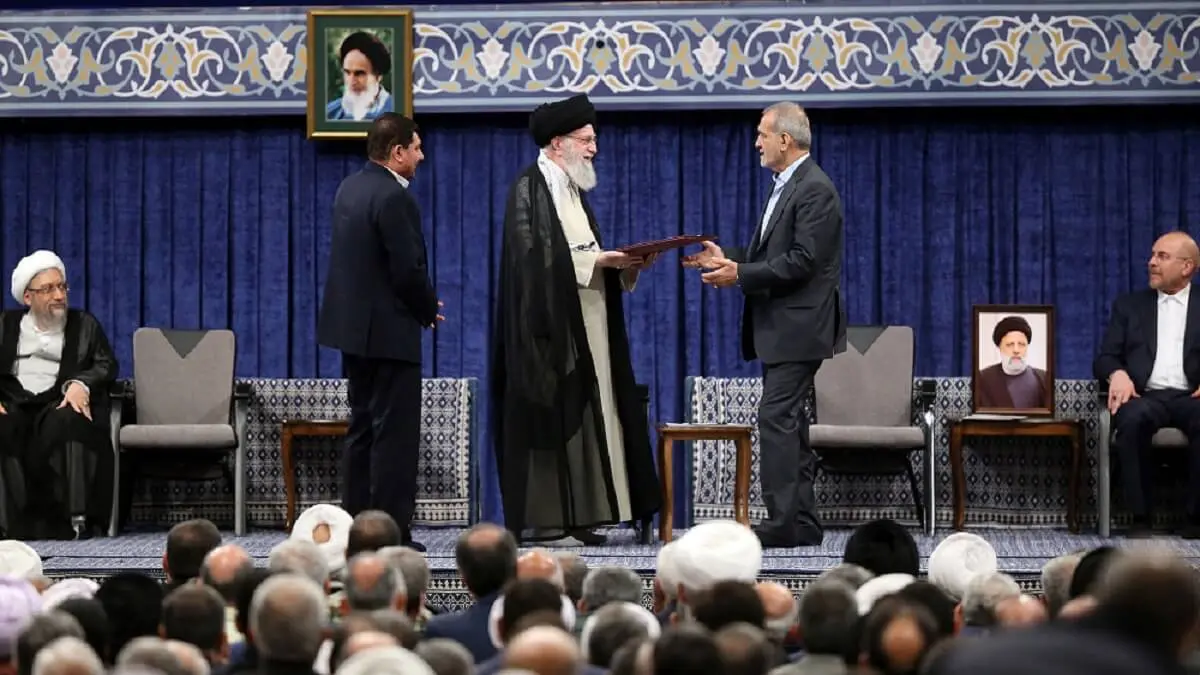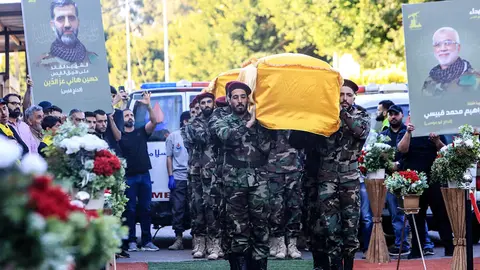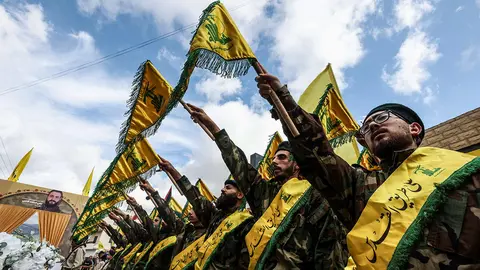For Iran, safeguarding nuclear programme overrides commitment to Hezbollah

While attending the United Nations General Assembly, Iran’s President Masoud Pezeshkian told a CNN interviewer that the Lebanese militant group Hezbollah “cannot stand alone against a country that is being defended and supported and supplied by Western countries”.
When asked if his country would stand by its main proxy in the Middle East in the face of the Israeli military onslaught, he vaguely replied that Iran “will defend any group that is defending its rights and itself.”
Otherwise, he tried to strike a peaceful and accommodating tone.
“We do not wish to be the cause of instability in the Middle East as its consequences would be irreversible.”
“We want to live in peace, we don’t want war,” he added. “It is Israel that seeks to create this all-out conflict.”
The Iranian leader missed no opportunity to highlight his country’s desire to stay out of the Israel-
Hezbollah confrontation.
“It is Israel that seeks to create this all-out conflict,” he said. “They are dragging us to a point where we do not wish to go.”
The Iranian president’s attention seemed to be much more focused on ending his country’s nuclear stand-off with the West than on dealing with the escalation of violence in Lebanon.
This week, Israeli air strikes have targeted Hezbollah leaders and hit hundreds of sites deep inside Lebanon while the group has fired barrages of rockets into Israel, where thousands have fled the border region. Hundreds of Lebanese have been killed.
He was mirroring Iran’s clerical establishment’s hopes to ease US sanctions, which have crippled the country’s economy, and to undercut any support in the West for Israel’s recourse to the military option against Iran’s atomic programme. Not even a war that threatened to defang Hezbollah could distract him from the strategic objective.
“We are ready to engage with participants of the 2015 nuclear deal. If the deal’s commitments are implemented fully and in good faith, dialogue on other issues can follow,” he told the United Nations General Assembly on Tuesday.
President Donald Trump had abandoned the 2015 nuclear pact between Tehran and six world powers in 2018 and reimposed tough sanctions on Iran. Since then, efforts to revive the pact have failed.
For Britain, France and Germany, who remain party to the nuclear deal, there is a sense that Tehran’s leadership did not and will not change course and that a broader accord encompassing the nuclear programme and Iran’s geopolitical role is unrealistic for now.
The United States, its European allies and Israel accuse Tehran of using its nuclear programme as a veil for efforts to try to develop develop an atomic bomb.
Analysts believe Tehran is determined to stay out of a war that could lead to the destruction of its nuclear facilities.
Chatham House’s Bronwen Maddox echoed a belief among these analysts that by escalating the war on Hezbollah, “Israel’s intention may be to create conditions for an attack on Iran’s nuclear facilities.”
Citing two Israeli officials, US news website Axios said Iranian officials have told their Hezbollah counterparts who sought their help that “the timing isn’t right” for launching an attack against Israel because Pezeshkian was now in New York for the UN General Assembly.
By asking for Iran’s backing Hezbollah would be in fact requesting a change of roles, say experts as Hezbollah is expected to provide a first line of deterrence against Israel if it ever sought to take on Tehran’s nuclear programme.
Ali Vaez, director of the Iran Project at the International Crisis Group told The New York Times, proxies like Hezbollah were supposed to defend Iran’s national interest and not the other way around: “It was never the principle that Iran would fight in their defence,” he said.
Pezeshkian even took his distance from the Houthis, Iran’s proxies in Yemen. “They don’t take orders from anyone,” he claimed. “It’s not like Yemenis are waiting for us to tell them what to do or what not to do,” he asserted.
For the purpose of appealing to the West, he also took his distance from Russia’s invasion of Ukraine.
“We do not approve of Russian aggression against Ukraine,” Pezeshkian said. “We have not and we will not supply them with any ballistic missiles.”
Russia has cultivated close ties with Iran since the start of its war with Ukraine and has said it is preparing to sign a wide-ranging cooperation agreement with Tehran.
Iran has also brokered secret talks between Russia and Yemen’s Houthi rebels to transfer anti-ship missiles to that militant group, Western and regional sources said, a development that highlights Tehran’s deepening ties to Moscow.
Many analysts were sceptical that the Iranian president could be adjusting his country’s policies towards Russia or regional proxies.
Only the Revolutionary Guards, who receive their marching orders from Supreme Leader Ayatollah Ali Khamenei, could take such decisions, say analysts.










